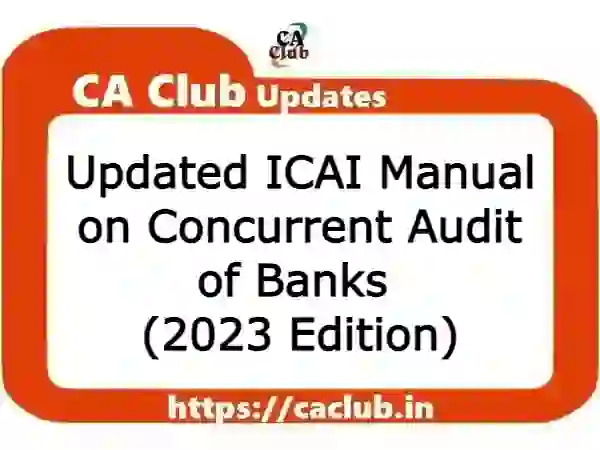The Institute of Chartered Accountants of India (ICAI) has released an updated 2023 edition of its “Manual on Concurrent Audit of Banks”. This revised version of the manual is a collection of the revised/updated concurrent audit guidelines issued by the Reserve Bank of India (RBI) in 2019 and covers various important amendments thereto.
As part of its efforts to support members in comprehending the complexities of concurrent audits and consequently enhancing the quality of concurrent audit reports, the Institute of Chartered Accountants of India’s (ICAI) Board of Internal Audit and Management Accounting (BIAMA) has released the revised and updated Manual on Concurrent Audit of Banks (2023 Edition). This updated version aligns with the Reserve Bank of India’s (RBI) revised guidelines on concurrent audits, which were published in September 2019. The ICAI has meticulously revamped the “Manual on Concurrent Audit of Banks,” which was previously issued in 2016. In addition to incorporating the impacts of RBI’s revised 2019 guidelines and other pertinent new circulars/directions issued by RBI, the Board has thoroughly overhauled the Concurrent Audit Checklist.
The Manual offers valuable guidance to members on pivotal matters pertaining to concurrent audits of banks. It emphasizes the importance of reorienting the scope of concurrent audits to incorporate a risk-based auditing approach, which ultimately renders it more meaningful and efficacious.
Reserve Bank of India’s Revised Guidelines
In September 2019, the Reserve Bank of India has made the recent revision in its concurrent audit guidelines, originally published in 1996 and revised last in 2015. The new guidelines emphasize effective controls, the importance of scrutinizing high-risk transactions, and coverage of fraud-prone areas. In response to these updated guidelines, the BIAMA of ICAI thoroughly revised the “Manual on Concurrent Audit of Banks,” which now reflects the impact of various new and revised RBI circulars issued during the intervening period.
Key Features of the Updated Manual
The 2023 edition of the Manual on Concurrent Audit of Banks is a comprehensive, self-contained document that touches upon almost all critical aspects of concurrent audit in banks. The updated manual includes the following significant features:
i) Latest Circulars and Directions: The manual incorporates guidance on the impact of various latest circulars and directions issued by the Reserve Bank of India, ensuring that it remains up-to-date and relevant. As a ready referencer, the manual is accompanied with the list of all important Circulars/Directions issued by the RBI, which impact concurrent audit.
ii) Three-Part Structure: The manual is divided into three parts, focusing on understanding the banking business and its legal framework, the domain of concurrent audit, and a concurrent audit checklist with a focus on the core banking system.
iii) Concurrent Audit Checklist: In line with the recent 2019 RBI Guidelines, the manual contains a detailed concurrent audit checklist to help auditors navigate the auditing process effectively.
iv) In-depth Coverage of Important Areas: The manual includes chapters dedicated to crucial areas such as Treasury, Forex, and Core Banking Solutions, providing comprehensive guidance for auditors.
ICAI’s Manual on Concurrent Audit of Banks (2023 Edition)
Conclusion
The 2023 edition of ICAI’s Manual on Concurrent Audit of Banks is an indispensable resource for professionals in the banking and auditing sectors. By incorporating the latest guidelines and circulars from the Reserve Bank of India, the manual ensures that auditors have access to accurate and up-to-date information. The detailed checklist and in-depth coverage of key areas make this manual a valuable tool for conducting thorough and effective concurrent audits in banks.
Related Posts:
Acceptance of Assignments by Concurrent Auditor of Bank Branches: ICAI Guidelines
